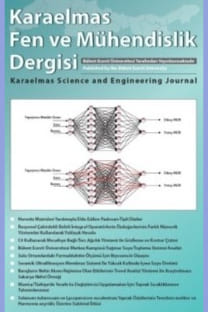Tıbbi Laboratuar Teknikleri Programında Durum Çalışması Yöntemi ile Biyokimya Dersinin Etkinliğinin Araştırılması
Bu çalışma, Bülent Ecevit Üniversitesi Ahmet Erdoğan Sağlık Hizmetleri Meslek Yüksekokulu Tıbbi Hizmetler ve Teknikleri Bölümünde eğitim gören Tıbbi Laboratuar Teknikleri programı birinci sınıf öğrencilerinin ile gerçekleştirilmiştir. Bu araştırma ile uygulamaya dayalı eğitim veren Tıbbi Hizmetler ve Teknikler bölümüne ait Tıbbi Laboratuar Teknikleri programı öğrencilerinin insan kaynaklarının mesleki eğitim yoluyla geliştirilmesi projesi kapsamında biyokimya derslerini durum çalışması ile öğrenme yaklaşımıyla işlemeleri; öğrencilerin etkili ve anlamlı öğrenmesini sağlayarak, bilgi eksikliklerinin olup olmadığının açığa çıkarılması ve eksikliklerinin giderilmesi amaçlanmaktadır. Çalışmanın sonucu; durum çalışması yönteminin biyokimya dersi etkililiğini arttırdığı ve öğrencilerin yönteme ilişkin olumlu görüşleri bulunduğunu göstermiştir
Anahtar Kelimeler:
B12, Durum çalışması, Folik asit, Tıbbi laboratuar teknikleri programı
Investigation of the Case Study Method of Biochemistry Course Effectiveness in Medical Laboratory Techniques Program
This study was conducted with the participation of students consisting of first-year who were undergoing training in Medical Laboratory Program of Bülent Ecevit University Ahmet Erdogan Health Services Vocational School. It is aimed that students of Medical Laboratory Program which gives education based on practice process their biochemistry course with case study approach within the scope of development of human resources through vocational training project; providing for students to effective and meaningful learning, it is intented to reveal whether or not the lack of information and remedy the deficiencies. The results showed that this case study method increased the effectiveness of biochemistry course and the students had positive opinions about the method.
Keywords:
Durum Çalışması, B12, Folik Asit, Tıbbi Laboratuar Teknikleri Programı,
___
- Anthony, G. 1996. Active Learning in a Constructivist Framework. Educ. Studi. Math., 31(4): 349-369.
- Perkins, D. 1991. What constructivism demands of the learner?. Educ. Techno., 31(9): 19-21.
- Camp, G. 1996. Problem-based learning: a paradigm shift or a passing fad?. Med. Educ. Online, 1(2): 1-6.
- Chakravarthi, S., Judson, J.P., Vijayan, P. 2009. An evaluative study on comparison of problem based learning and lecture based pedagogy on self directed learning in undergraduate medical education. Indian J. Sci. Technol., 2 (12): 59–67.
- Macdonald, D., Isaacs, G. 2001. Developing a Professional Identity through Problem-Based Learning. Teach. Educ., 12 (3): 315–333.
- Adams, SA. 2010. Blog-based applications and health information: Two case studies that illustrate important questions for Consumer Health Informatics (CHI) research. International. J. Med. Info., 79 (6): 89–96.
- Redman, BK. 2007. The Practice of Patient Education: A Case Study Approach. Els. Health Sci., 1–157.
- Rolls, G. 2005. Classic Case Studies in Psychology. Hodder Educ. (2nd ed.), Abingdon, England.
- Kara, İ.H., Çeler, H.G., Yılmaz, A., Deler, M.H., Leziz, H., Baltacı D., Ataoğlu, A., Memişoğulları, R. 2014.
- Determination of Hemogram, Folic Acid and B12 Vitamin Levels of Depression Patients Followed Up in Psychiatry Out Patient Clinic. Euras. J. Fam. Med., 3(2): 69-78.
- Avşar, AFY., Taş, EE., Akçay, GY. 2013. B-12 Vitamini ve İnfertilite. Ankara Med. J., 13(2):82-84.
- Baytan, B., Özdemir, Ö., Erdemir, G., Güneş, AM. 2007. Çocukluk Çağında B12 Vitamini Eksikliği Klinik Bulgular ve Tedavi. Uludağ Üniv. Tıp Fak. Derg., 33(2) 61–64.
- Stabler, SP. 2013. Vitamin B12 Deficiency. N Engl J Med., 368: 149-160.
- Cliff, WH. 2006. Case-based learning of blood oxygen transport. Adv. Physiol. Educ., 30(4): 224–229.
- Marioni, C. 1989. Aspects of students’ understanding in classroom settings (age 10-17): case study on motion and inertia. Phys. Educ., 24(5): 273.
- Kessler, R. 2008. Collaborative Medicine Case Studies: Evidence in Practice. Dale Stafford. Springer: New York
- ISSN: 2146-4987
- Yayın Aralığı: Yılda 2 Sayı
- Başlangıç: 2011
- Yayıncı: ZONGULDAK BÜLENT ECEVİT ÜNİVERSİTESİ
Sayıdaki Diğer Makaleler
The Effects of Microwave Energy to the Drying of Apple (Gala) Slices
SONER ÇELEN, Ayşen HAKSEVER, AYTAÇ MORALAR
Variant Bussinesq Denklemlerinin Hareket Eden Dalga Çözümleri için Tan F ξ /2 Açılım Metodu
Briyofitlerden Elde Edilen Fenolik Bileşikler
YASİN HAZER, HATİCE ÇÖLGEÇEN, GÜRAY UYAR
Tekil Olmayan Tanımlayıcı Sistemler İçin Kontrol Tasarımı
n-Mertebeden Türevlenebilir Quasi-Konveks Fonksiyonlar Yardımıyla Eşitsizlikler
Ucuz Biyosorbent ile Metilen Mavisinin Uzaklaştırılması İçin Kolay Yol
Karadeniz’de Meydana Gelmiş Deniz Fırtınalarının Sayısal Modellenmesi
Tiyosemikarbazon İçeren Vis-Dioksim Ligandının Ni II Kompleksinin DNA Etkileşimlerinin İncelenmesi
